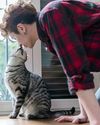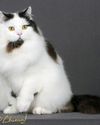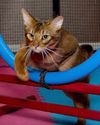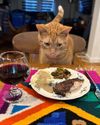
Several veterinary genetic laboratories, both academic and commercial, offer multi-test profiles of a few dozen of the most popular genetic screens to more than 50. Several labs have added to their feline genetic screening profile two inherited blood clotting disorders: Factor IX (Christmas Factor) deficiency and Factor XII (Hageman) deficiency.
Why are these important, and what should a breeder do if one of their cats is found to carry one of these traits? Before we answer those questions, a brief discussion of blood clotting mechanisms and current laboratory screening tests of the efficiency of those mechanisms is necessary.
The Miracle of Blood Clotting
We take it for granted. We are playing with Fluffy and his favorite toy, and our hand gets in the way of that paw batting at the toy. We yelp a little, look at the scratch oozing a tiny bit of blood, then wipe it off with the nearest available absorbent form of paper. Already stopped bleeding, we think to ourselves. We shake it off and think to ourselves that Fluffy is overdue for a nail trim.
What we fail to appreciate is that not only does Fluffy need a nail trim, but those claws of his set off a cascade of biochemical reactions that has saved our life, time and again, and we don't even realize it. That process is more formally called hemostasis.¹ Hemostasis is essentially the same process in both humans and felines.
This story is from the {{IssueName}} edition of {{MagazineName}}.
Start your 7-day Magzter GOLD free trial to access thousands of curated premium stories, and 9,000+ magazines and newspapers.
Already a subscriber ? Sign In
This story is from the {{IssueName}} edition of {{MagazineName}}.
Start your 7-day Magzter GOLD free trial to access thousands of curated premium stories, and 9,000+ magazines and newspapers.
Already a subscriber? Sign In

Holiday Aromatics
Are They Naughty or Nice?

Feline Photographers Part 2
Social media is rife with pictures of our pets, especially cats.

Celebrating the Season With Our Cats
As this writer began work on this project to find holiday stories involving cats, she was amazed to find that there are ELEVEN religious holidays celebrated during December!

How Cats Find Their Owners
A month after losing her beloved senior cat, a woman named Amin Diane was parked on a street at night, waiting for her friend.

Remembering Willa Hawke
Retired CFA Judge Emeritus Willa Hawke passed away August 2, 2024 in Lake Kiowa, TX at the age of 88. She had been a judge for over 50 years before her retirement in 2016.

UP CLOSE AND Purr-sonal
Thoughtful... Caring ... Giving ...Helpful... Committed.

DON'T PUFF AROUND PUFF!
THE EFFECT OF SECONDHAND SMOKE ON CATS

Fluffy Coats
AND HOW TO CARE FOR THEM

Feline Agility?
I Thought Agility Was For Dogs!

Come Fly With Me!
TIPS ON NAVIGATING AIRPORT SECURITY WITH YOUR CAT